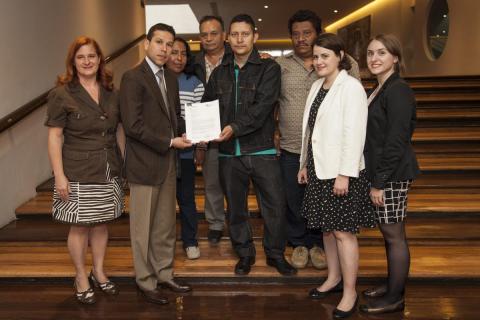Mayo 4, 2015
New Rules for the H-2B Program Increase Worker Protections

On April 29, 2015, the U.S. Departments of Labor (DOL) and Homeland Security (DHS) published two new rules in the H-2B visa program that establish protections for transnational migrants and U.S. workers, while containing some concerning measures that may lower workers’ wages. Both rules went into effect immediately on April 29.
The first rule is comprehensive, describing many aspects of the H-2B program, and will be finalized after a 60-day period during which workers, employers, advocates and others can send comments to the government. The second rule is about wage rates, and is already final. The new rulemaking is in response to a court’s decision that cast uncertainty on the program’s future.
Protections for H-2B workers in the comprehensive rule include:
- Job Contracts. Employers must provide a copy of the job order to each H-2B worker in a language the worker understands no later than when the worker applies for the visa. Workers often rely on false promises about the pay and work conditions in deciding to go to the U.S. Contracts help prevent fraud and misinformation.
- Contractual Prohibition on International Labor Recruitment Fees. In their contracts with recruiters, employers must specifically prohibit recruiters from charging international labor recruitment fees. This will help prevent workers from going into debt just to get a job.
- Three-Fourths Guarantee. To prevent over-recruitment of workers, employers of H-2B workers will be required to pay them at least three-quarters of the hours promised in the work contracts. In the past, workers have been brought to the U.S. and then given little or no work, while paying high costs for housing and food.
- Prohibition on Retaliation. H-2B employers are prohibited from retaliating against workers for filing complaints, consulting with workers’ centers or lawyers, and exercising any right or protection.
- Reimbursements for Visa and Transportation Fees. Employers must pay or reimburse workers for inbound travel expenses after a worker completes 50 percent of the employment contract. Employers must also cover outbound travel expenses for migrants who work until the end of the job order or who are dismissed before the end of the job order.
Unfortunately, the final wage rule is forecast to lower wages for all workers by allowing employers to use wage surveys, a practice that the Third Circuit recently struck down in Comité de Apoyo a los Trabajadores Agrícolas v. Perez. In writing the wage rule, DOL and DHS included many concessions to H-2B employers.
The new comprehensive H-2B rules are an important victory for H-2B workers and their allies. In mid-April, leaders of the Comité de Defensa del Migrante, a group of Mexico-based migrant workers and their families, delivered a petition with almost 3,000 signatures to representatives of the U.S. Embassy and the Department of Labor in Mexico City, demanding that the new rules include strong worker protections. That same week, members of the Comité spoke with Radio Bilingüe about their experiences working with H-2B visas and laid out some of the protections they would like to see in the regulations:
“After paying the visa fees and everything, [my employer] took $500 USD out of my first check. I asked my boss, ‘What is this?’
‘Ah, those are for your visa expenses,’ [she said]. ‘And you still owe me another $500 USD.’ I have pay stubs that show this. …
We need that kind of thing to end, because one goes to the United States to earn some money, to be able to support one’s family and all that. When this kind of thing happens, the American Dream ends.
--Jorge, a former H-2B fair and carnival worker
“We want to see a rule that gives us the right to information about working conditions. Also, we should not have to pay to have the opportunity to work… The recruiters who recruit people charge fees to find you a spot to go work. We should also have a guarantee about the number of hours we will be paid to work.”
--Elisa, a former H-2B crab worker
Listen to the Radio Bilingüe story here.
More advocacy is needed to ensure that worker protections are in the final rule. Over the next 60 days, members of the public will be able to share comments about the rules with DOL and DHS as the departments prepare their final comprehensive rule. Read more here!
